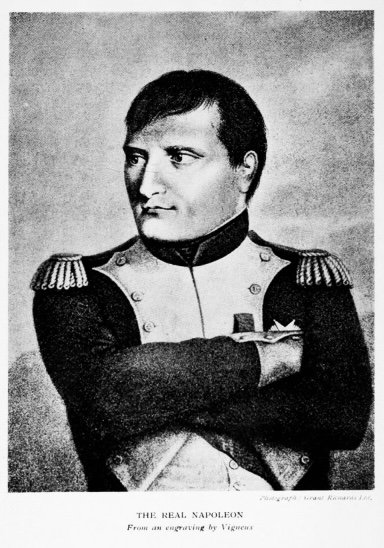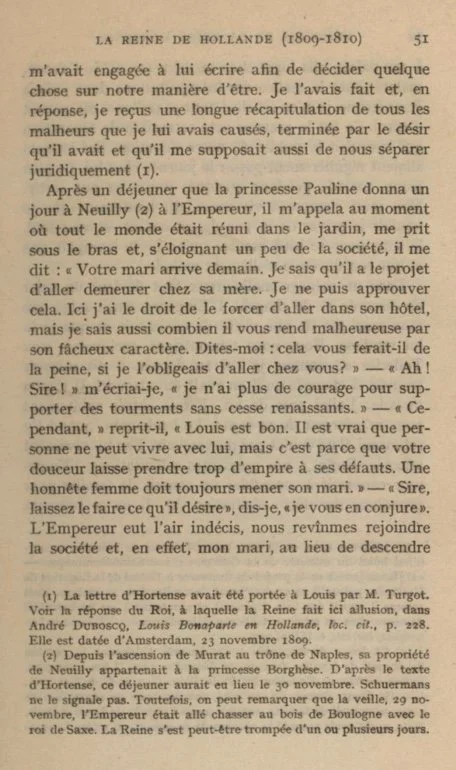Let’s have another look at Hortense’s Memoirs. If you want to read the book it is available for free at the side bar in English and French. Use the widget on the sidebar to translate the text below into pretty much any language.
The sad occasion plays out while Napoleon keeps trying to patch up Hortense with his brother Louis.
Hortense’s memoirs continues:
The Emperor, doubtless with a view to bringing about a reconciliation between Louis and myself, had urged me to write the King about what was going on. I did so. In reply I received a long review of all the misfortunes of which I had been the cause, ending by the expression of a wish, which he considered was probably in keeping with my own desires, that we secure a judicial separation.
After a lunch which the Princess Pauline gave for the Emperor at Neuilly, the Emperor called me over to him, and while the guests were all in the garden slipped his arm through mine and led me a little away from the rest of the people, saying as he did so "Your husband arrives tomorrow. I know he intends to live at his mother's house. I do not approve of that. Here in France I have the right to oblige him to go to his own house, but I know how unhappy his disagreeable character makes you. Tell me, would you feel badly if I ordered him to go to your home?"
“Sire," I exclaimed, "I lack the courage to bear this continually renewed suffering."
“Yet," he replied, "Louis is kind. It is true nobody can live with him, but that is because your gentle nature does not sufficiently curb his faults. An honest woman should always rule her husband."
“Sire, I beseech you, let him do as he wishes." The Emperor appeared undecided. We rejoined the rest of the party, and as a matter of fact my husband, instead of returning to his palace, went to his mother's house.
I admit, in spite of all the malicious gossip this caused, I congratulated myself that he had done so, so much did his presence alarm me. Our not living together was the first indication the public had that we were not a devoted couple. The children always spent their evenings with their father. The youngest one, who had not been well for several days, was not able to go out.
My husband lost his temper and declared openly that I wished to prevent his seeing the little boy. He came alone in the evening to see the baby in his bed in order to convince himself that his son was really ill.
Between married people who are unhappy together everything becomes a reason for quarrels and discussions. The Emperor had insisted that my husband make me a formal visit, and I returned his call.
We occasionally met at the Tuileries and, as I have heard since, he said that he found me so altered in appearance that he felt sorry for me. The King fell ill. I went to see him and entered without being announced, anxious to obtain news of his health. The next day when I went back he refused to receive me. I was much upset.
At last in response to our repeated demands the Emperor called a family counsel to pass on the question of our separation. Neither side was able to present any serious grounds, and the Emperor said several times: "They are children. There isn't as much as a sheet of paper between them. They must make up their quarrel."
During this period many fêtes were being held in Paris to celebrate the Peace with Austria. Everyone was aware that the Emperor's divorce was about to take place, but in accordance with her usual line of conduct the Empress attended all the receptions wearing the imperial crown, although convinced that in a short time it would be worn by another.
At this time and up to the moment of the divorce the kings of Saxony, of Württemberg and of Bavaria were in Paris.
The Empress received them. My brother had gone to meet the King of Bavaria to inform him of the separation. The King was deeply affected by the news. He regretted his arrival just at this time, which made it seem as though he had come to act as a witness.
He wished some definite arrangement to be made as regarded the Viceroy's future. The Emperor was quite agreeable to the idea and proposed to my brother a kingdom made up of the Illyrian provinces, the Tyrol or any other region he preferred.
My brother always replied, "I am asking for nothing at all; do not trouble about me."
The Empress also insisted that something be done about her son, as his title of Prince of Venice did not assure him the Italian crown, which belonged by law to the Emperor's second son.
But the Viceroy was positive in his attitude that he was not prepared to accept a throne or any other advantage that would seem to have been a ransom for the mother's misfortune.
Finally, on December 15, 1809, the day of the divorce, all the family assembled in the Emperor's principal study, where he had been alone with the Empress."
Each took his place in accordance with his rank. The High Chancellor and Count Regnaud de Saint-Jean-d'Angely came in, and both remained standing.
The Emperor took up a piece of paper and began to read in a clear and steady voice. When, however, he came to the phrase "she has made my life more beautiful for fifteen years" his emotion was evident.
The Empress then read her statement. Tears prevented her from completing it.
She handed it to Count Regnaud, who finished it although he too was weeping. The official report of the proceeding having been drawn up and signed by all those present, the Emperor embraced the Empress and led her to her apartment.
A little later he came to fetch me and took me to her. I found her exhausted and over-come with the strain she had been under. I felt it was necessary to keep up her courage to the end. In order to do so I reminded her of the misfortunes of that other queen who had preceded her in this same palace and had left it only to mount the scaffold. I pointed out how much more fortunate she was and dwelt on the consolations that still remained to her.
Finally, her courage seemed to revive. On the preceding day my brother had gone to the Senate to announce the divorce and declare that it took place with our consent.
The next morning, early, I went to see my mother. Her drawing-room was filled with ladies in waiting, weeping over her departure. I feared the effect this emotion would produce on her, although I felt that the worst was already over.
To leave a court is not the same as leaving a place where you have been happy. I led my mother to her carriage while the Emperor was attending his cabinet meeting.
He had already said good-by to her. I was not present when he did so, but I can imagine how heartrending it must have been. Our trip to Malmaison was a sad and silent one. When my mother entered that house where she had been so happy her heart was heavy with grief.
“If he is happy," she said to me, "I shall not regret what I have done." As she spoke her eyes constantly filled with tears. The day after she had left the Tuileries the Emperor came to see her.
Her attitude in receiving formally the man who only twenty-four hours before had been her husband was widely commented on. The Emperor took her hand and chatted with her for a long time as they walked about near the chateau. Every day he sent her a messenger bearing a letter in which he complained of being lonely and said how much he was missing her.
He went to the Trianon and asked us to come and see him there. I accompanied my mother. The interview was a touching one. The Emperor wished my mother to stay to dinner. As usual he sat opposite her. Nothing seemed to have changed.
The Queen of Naples and I were the only other guests. The Emperor's pages and the Prefet of the Palace were as usual in attendance. No one spoke. My mother was unable to swallow a mouthful, and I looked as though about to faint. The Emperor several times wiped his eyes without saying a word. We left immediately after dinner. My mother afterwards reminded me of the tears she had seen in the eyes of the man for whom she still cared. She seemed to find a moment's comfort in perceiving that he shared her regrets for the past. But time went on.
The original French is available below:













